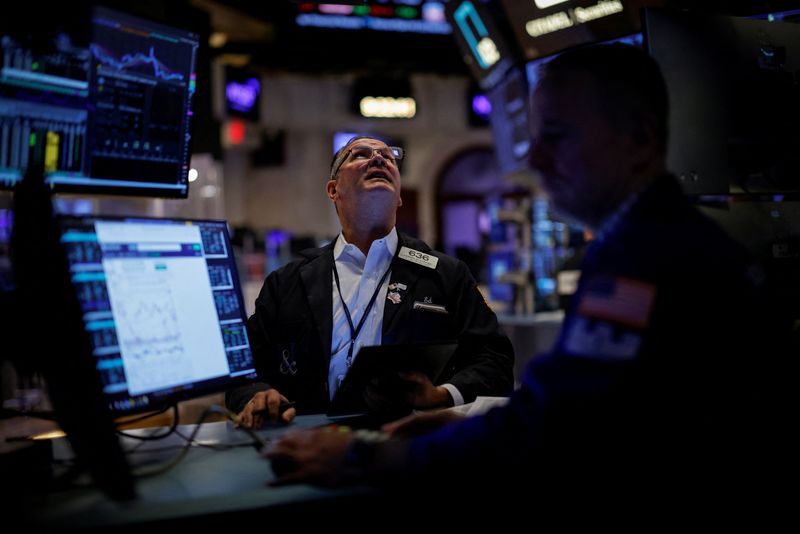A look at the day ahead in U.S. and global markets from Mike Dolan
U.S. Treasuries are starting to balk at post-election fiscal prospects and the resulting spike in benchmark borrowing rates has knocked stock markets off their perch and lifted the dollar to its best level since early August.
Ten-year Treasury yields zoomed higher again on Tuesday, topping 4.2% for the first time in three months.
On one level, there's been some further dialling back of Federal Reserve easing expectations - with an implied 'terminal rate' for the whole Fed easing cycle backing up close to 3.5% next year and less than 150 basis points from the current policy rate.
The robust performance of the economy is mainly responsible for that, as is the steady stream of Fed officials speaking of only 'modest' rate cuts ahead. Trepidation about market-based long-term inflation expectations troughing as high as 2.3%-2.5% is also starting to shift the horizon somewhat.
But investors are mostly focussed now on next month's election and the absence of any plan from either party to rein in budget deficits already well north of 6% of GDP. What's more, betting markets now lean toward the candidate - Donald Trump - most likely to aggravate that fiscal position and bookmaker bets on a Republican clean sweep of Congress are rising too.
Reflecting some of those concerns, the New York Fed's estimate of the 10-year Treasury 'term premium' - a key measure of the compensation investors demand to hold long-term government debt securities - has risen to its highest level of the year, at more than 14 bps. It's been negative for most of the year.
BlackRock (NYSE:BLK) boss Larry Fink repeated his warnings about the deficit situation at an event on Monday, saying rising government debt was a 'big problem' and both parties were guilty for the widening deficits.
The back-up in Treasury yields this week has lifted the dollar index to its best levels since August 2, with currency markets also parsing the implications of Trump's sweeping trade tariff plans.
Goldman Sachs said on Tuesday the euro could fall as much as 10% - implying a drop below $1.0 from current levels - in a scenario in which Trump imposes widespread tariffs and cuts domestic taxes if he returns to the White House.
A 10% global tariff and 20% levy on Chinese imports, combined with the stimulus of domestic tax cuts, could cause the dollar to rally sharply and the euro to drop 8% to 10%, Goldman's Michael Cahill told clients.
Although the euro regained some footing, the dollar continued to push higher above 150 yen as Japan's weekend election is eyed by markets. The Canadian dollar was also on the back foot ahead of a possible jumbo 50bp rate cut from the Bank of Canada on Wednesday.
With election and debt worries, geopolitical angst and longer-term inflation questions as a spur, gold continued to probe higher - though remained just shy of intraday records set at $2740 on Monday.
The bond market rumbling has been enough to knock Wall Street stocks back from new records, although the tech-heavy Nasdaq outperformed and made some gains ahead of megacap corporate earnings later this month. Futures were mostly in the red ahead of Tuesday's open, however.
Much of the macro world will be focussed on the International Monetary Fund's annual meeting in Washington, with the IMF's latest World Economic Outlook due for release later and multiple top central bank officials speaking around the event.
Overseas, Japan's Nikkei ended down more than 1% despite the weaker yen, and Chinese stocks were mostly flat. Europe was lower too.
In corporate developments, there was good news in the tech sector from SAP, whose shares rose 5% after the German software company raised full-year targets on strong cloud business.
And HSBC Holdings (NYSE:HSBC) said on Tuesday it would combine some of its commercial and investment banking operations in a major overhaul under new CEO Georges Elhedery. A new leadership structure, which includes the appointment of Pam Kaur as the lender's first female chief financial officer, will carve up its operations into four business lines - Britain, Hong Kong, corporate and institutional banking, and wealth banking.
Key developments that should provide more direction to U.S. markets later on Tuesday:
* US corporate earnings: Texas Instruments (NASDAQ:TXN), General Motors (NYSE:GM), General Electric (NYSE:GE), Verizon (NYSE:VZ), Baker Hughes, Enphase Energy (NASDAQ:ENPH), Packaging (NYSE:PKG) Corp of America, Invesco, CoStar, Seagate Technology, Paccar (NASDAQ:PCAR), Fiserv (NYSE:FI), 3M, Moody's (NYSE:MCO), Quest Diagnostics (NYSE:DGX), Pentair (NYSE:PNR), Pultegroup, Sherwin Williams, Danaher (NYSE:DHR), Freeport-McMoRan (NYSE:FCX), Interpublic, Norfolk Southern (NYSE:NSC), RTX, Genuine Parts, AO Smith (NYSE:AOS)
* International Monetary Funds releases World Economic Outlook at IMF-World Bank Annual Meetings in Washington; European Central Bank President Christine Lagarde, ECB chief economist Philip Lane and Bank of Portugal governor Mario Centeno all speak; Bank of England Governor Andrew Bailey, deputy governor Sarah Breedon and BoE policymaker Megan Greene all speak

* Richmond Federal Reserve's October business surveys; Canada September producer prices
* Philadelphia Federal Reserve President Patrick Harker speaks